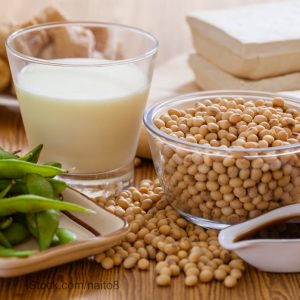Research conducted by Professor Suresh Neethirajan at the University of Guelph in Canada has shown that soy isoflavones and peptides may inhibit the growth of pathogenic microbes that cause food poisoning. The study, published in Biochemistry and Biophysics Reports for the July 2016 issue, tested soy peptides against bacterial biofilms for antimicrobial activity.
 The researchers found that the soy peptides had an inhibitory effect on Listeria monocytogenes. Another peptide was effective against Pseudomonas aeruginosa and Listeria monocytogenes. This could make these compounds an alternative to antimicrobials and antibiotics currently used.
The researchers found that the soy peptides had an inhibitory effect on Listeria monocytogenes. Another peptide was effective against Pseudomonas aeruginosa and Listeria monocytogenes. This could make these compounds an alternative to antimicrobials and antibiotics currently used.
Pathogenic bacteria can develop biofilms in different conditions, which enable them to emerge as resistant strains. There is always a need to develop new antimicrobials and antibiotics that can destroy these biofilms. Bioactive antimicrobial peptides (AMPs) are protein fragments that can bind to specific receptors on target cells.
AMPs interact with bacterial cell membranes, and penetrate the cells, changing the pH gradient, membrane potential, and osmotic regulation. Two soy based antimicrobial peptides, known by the acronyms PGTAVFK and IKAFKEATKVDKVVVLWTA, were screened. Those peptides were chosen for the study based on published papers that investigated their antimicrobial activity. Peptides can act as hormones, hormone producers, or neurotransmitters. The isoflavones act as hormones and control the biological activity in the bacterial cells.
These peptides could be used in the development of “plant based, biocompatible, and biodegradable alternative antimicrobial agents,” according to the study. Soy can be a more effective antimicrobial agent than synthetic chemicals, and it is non-toxic.
The researchers are hopeful about the discriminate nature of the antimicrobial peptides. Dr. Neethirajan said, “the really exciting thing about this study is that it shows promise in overcoming the issue of current antibiotics killing bacteria indiscriminately, whether they are pathogenic or beneficial. You need beneficial bacteria in your intestines to be able to properly process food.” The next step in this research is large scale tests.




